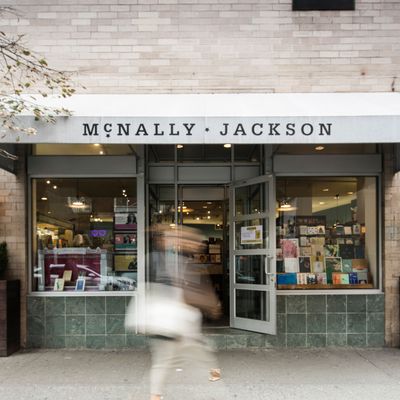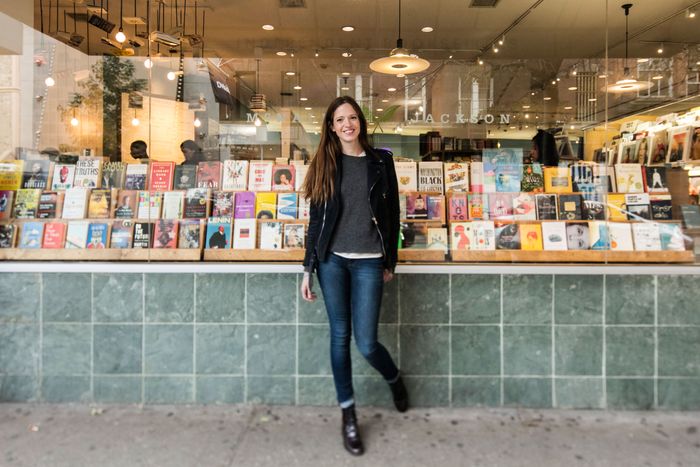
In October, bookshop owner Sarah McNally announced that she was leaving her longtime location on Prince Street. In the last four months, everything has changed. Not only is McNally Jackson’s flagship staying put, but the store is opening two more branches as soon as this fall — including one in Downtown Brooklyn that hasn’t been previously announced. It will be located at City Point, the mixed-use commercial development (just don’t call it a mall) that also houses Alamo Drafthouse Cinema and a satellite Katz’s Delicatessen. The other coming location, at South Street Seaport, has been in the works for years.
Factoring in the satellite store that opened last year in Williamsburg and a small shop at LaGuardia Airport, it’s almost starting to feel like one of New York’s favorite independent bookstores is turning into a local chain.
“No! Don’t say it!” McNally said when I raised the suggestion. We met last week at her apartment in Greenwich Village, where pencil-drawn designs for the City Point location were spread across her living-room table. She was eager to show them off, having spent half the night marking them up. Surrounding us was a truly incredible number of books on floor-to-ceiling, wall-to-wall shelves.
McNally said that prospective landlords had approached her — and not the other way around — for both the Seaport and City Point projects. Evidently, they were attracted to McNally Jackson’s masstige-friendly brand: beautiful interiors, a deep and cosmopolitan book inventory, exceedingly well-read staffers, and high-end stationery. In other words, something like the independent bookstore par excellence. It’s almost enough to inspire hope for the future, and probably guarantees that McNally Jackson’s outposts won’t feel like franchises.
“If you had told me when I opened my first store, when I was 29, that I would eventually open four, I would have said no way,” McNally said. She had her long hair in a ponytail and was wearing a T-shirt emblazoned with her original store’s layout. “I felt like I needed to have a connection with every shelf and every book,” she added. “But after 15 years, at Prince Street, I don’t need to have that connection — because someone there does.” She’s cultivated a staff with diverse tastes. “There are so many extraordinary booksellers that I’m not afraid anymore. I can just pass the new stores over — it’s like a trust fall or something.”
The catalyst for her store’s near-move last year was a massive hike in annual rent: from $350,000 to $850,000. McNally said she came close to signing a lease on another spot in the neighborhood, but couldn’t shake her emotional attachment to the current space. I was surprised to hear this, given that she trashed the place when we spoke in October — its peeling paint, leaky pipes, and crooked corners. “Sometimes you don’t know what you have until it’s gone,” she explained. Ultimately the landlord, Alex Berley, made her a deal: $650,000 a year for now, with gradual increases over the next five years. At that point, she’ll reassess.
Regardless of what happens on Prince Street, the company seems to be more secure than ever. Both of her new landlords are charging affordable rates, likely far below what they could get from corporate tenants, and even giving her money to help build. Perhaps they want the cachet, or perhaps they think a store like McNally Jackson will drive foot traffic and appeal to prospective tenants of the on-site housing. “The interesting thing is, the only way that rents can become affordable is if you become part of a larger picture,” she said. “I become part of the mission of what they’re building.” In this scenario, a store like hers becomes not a victim of gentrification but an active participant in its current iteration: the growth of live-work-shop nodes of development.
The City Point store will occupy two floors and roughly 5,300 square feet, about as much as the Prince Street store — though instead of a café, McNally thinks she’ll put in vast stationery and young-adult sections. She might also add a science and technology area, hemmed in by tall shelves so as to feel like a miniature store unto itself.
The two-story Seaport shop, meanwhile, will span several buildings and more than 7,000 square feet. The windows upstairs will overlook the water and the cobblestone streets. “I get the chance to craft a beautiful bookstore, like New York has never had — other than Three Lives,” the West Village store that opened in 1968. “It’s like John Sandoe in London, but huge.” The developers rejected her idea for a literal labyrinth of bookshelves, which visitors would pay to enter, so she’s settling for old leather armchairs chairs inside and a bar with outdoor seating. It’s part of a bigger development that will include restaurants led by David Chang and Jean-Georges Vongerichten and a hotel developed by the Cipriani family.
The Prince Street store will see some renovations this year, too: more shelves, a new paint job, no more galvanized metal. One design theme common to all of McNally’s locations is the “radial model” she learned from her parents, who own Canada’s largest independent bookstore. It amounts to creating secluded spaces to isolate shoppers from foot traffic. “It’s not like people are coming because they don’t know how to use the internet,” she said. “They’re coming to really communicate and interact with the books. I always say that between a reader and an author, it’s a compatibility thing, like with people.”
Are there any more outposts in her future, maybe down the line?“ I would do a bookstore in Midtown, I bet,” she said. She started talking about its abundance of office workers and the dearth of independent bookstores — but a moment later she retracted. “I doubt it. There’s a point where you have to stop.”


